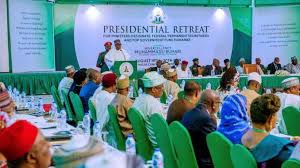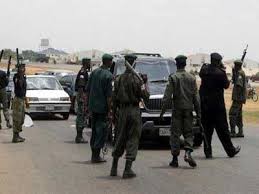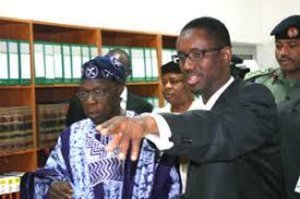Solomon's Column
The Search for Exemplary Leaders in Nigeria Continues
- By solomon2day
- On 02/12/2019
- Comments (0)
- In Solomon's Column
The present administration in Nigeria insists that it to anchors its policies on transparency, integrity and honesty.
For several years successive administrations in the country have failed to incorporate the aforementioned in the national life.
Rather, activities and actions have been channeled towards stagnancy, retardation and underdevelopment.
At the inauguration of boards and parastatals in Oyo state, on 24 June, 1999, the then Governor of Oyo state, Alhaji Lam Adesina, of blessed memory, stated : ”We took our time in ensuring that men and women of integrity and probity are chosen among innumerably qualified men and women. We don’t like to be proved wrong and this is why we implore you to rise up to the challenge and improve the lot in your work place.''
”We are very serious when we promised our people that probity and public accountability will be our watch word, most of the areas, you have been posted to, are afflicted and already grounded by financial impropriety and squandermania. We, as an administration have made covenant, with our people and we shall not renege on it”, Alhaji Adesina concluded.
Indeed, Nigerians are still wondering, if the present crop of political appointees at both the Federal and State levels would make probity and public accountability their watch word, considering the rot in the system. Interestingly, the appointees are yet to publicly declare their assets.
In 2009, the Day Star Christian Centre organized a conference, ”Excellence in Leadership”. In attendance, was the then Governor of Lagos state, Babatunde Fashola, who is now the Minister of Works and Housing.
Fashola had emphasized the need for Nigerians to embrace the basic values of good conduct.
”By sowing for an early crop, the capacity to ‘lead’ particularly in our youths, we can guarantee this nation, a harvest of exemplary leaders that our people so dearly expect and indeed deserve”.
Without doubt, the country is in dire need of principled and visionary leaders. However, the absence of people with good leadership qualities has for long served as a major impediment towards achieving developmental goals.
But the existence of principled and visionary leaders, seems to be a mirage, when confronted with the fact that most power brokers end up managing wayward children.
In the political scene, the Father continues to contend with issues of governance, while the Mother runs around to boost the fortunes of her pet project.
At the end of it all, the children grow up without parental care, with their behaviour, similar to that of their Nannies and Teachers.
The ”World is yours” becomes their creed, while the state and its resources are at their beck and call. Indeed, transparency, integrity and honesty is not yet within reachable distance.
The Other Side of Safeguarding the Lives and Property of Nigerians
- By solomon2day
- On 26/11/2019
- Comments (0)
- In Solomon's Column
Insecurity in Nigeria : Facts that ought not to be ignored
- By solomon2day
- On 21/09/2019
- Comments (0)
- In Solomon's Column
Nigerians have expressed visible worries over the activities of criminals operating in commercial motorcycles, vehicles with tinted glasses, vehicles with foreign plate numbers, and vehicles without number plates.
They argue that most crimes in different parts of the country are committed through these motorcycles and vehicles and express surprise over the way the criminals beat the scrutiny of law enforcement agents along the road.
Innocent citizens who reside in Lagos, Ibadan, Benin City, Port Harcourt, Warri, Onitsha, Aba, Kaduna, Kano, and Abuja, among others, have continued to recount their tales of woe to whoever cared to listen.
Sadly, the law enforcement agents, saddled with the responsibility of ensuring law and order and the adherence to the road safety rules and regulations, have for long adopted a conspiratorial attitude, mainly because of the benefits that would accrue from aiding and abetting criminals.
Nigerians are now of the opinion that the laws of the land are either no longer functional or the law enforcement agencies are deliberately sabotaging the enforcement of the laws.
A victim of the worrisome state of insecurity in Ibadan, Nigeria, who spoke incognito, reveals his experience.
‘’There is a beer parlor opposite the Iyanganku Magistrate; it is among the several shops that share the same fence with the police barracks. A door inside the beer parlor leads into the barracks. Visit the beer parlor and observe those who patronize the beer parlor, and you will agree that those who break the law have the blessing of the persons whose statutory functions include the protection of lives and property, he stated.
The general feeling is that some criminally minded law enforcement agents make use of criminals as proxies in carrying out their statutory functions, which has resulted in the harassment, intimidation, and arrest of unsuspecting citizens.
Of worry is the adopted official status of lawlessness, indiscipline, and criminality in different parts of the country.
Indeed, illiteracy and ignorance have also contributed significantly to the scheme of things as presently constituted.
The mental psyche of millions of Nigerians has been dehumanized; this has resulted in unthinkable occurrences.
These occurrences have consumed a sizable chunk of those in charge.
The widespread, uninhibited prevalence of the lawless acts, to millions of Nigerians, is an indication that there is already a failure in leadership; with no visible remedy in sight for now.
Leadership : Between China and Nigeria
- By solomon2day
- On 28/08/2019
- Comments (0)
- In Solomon's Column
Mao Zedong popularly known as Chairman Mao, was successful with his noble goals for China through despotic means.
His leadership was severe, dictatorial and personalized.
For as long as Chairman Mao's cultural revolution lasted, thousands of Chinese died of starvation and inhuman labor.
Mao and his co-travelers argued that same was the price their people had to pay for re-education.
This brand of governance ensured the extermination of the heroes of the civil war and the old party chieftains by the President's armed squad.
Chairman Mao is perhaps the role model of those who hold sway in Nigeria today.
Indeed, the Kaduna state Governor, Mallam Nasir El Rufai is among several other political office holders, who adore President Muhammadu Buhari.
Those in support of this argument insist that on a number of occasions, the Kaduna state Governor had knelt down to greet and/or consult with the President. They maintain that this is only a sign of respect in the traditional African setting.
However, those against this order of things, stress that the underlying factors revolve on hypocrisy and boot licking.
Nigerians are yet to stop complaining of constitutional breaches and the unabated trampling of the rule of law in the dust, without noticeable changes by the powers that be.
From recent events in the country, the economic reform programmes of the All Progressives Congress(APC) led government at the centre and in the states, are modeled along the thinking of a free market economy.
It is doubtful, if government, in the last three years, has managed the economy for the benefit of Nigerians.
At a particular point in time, the Vice President, Prof. Yemi Osinbajo launched the ''Trader Money'' in Abuja.
The target beneficiaries are petty traders in the country and the collateral free loans for them, ranges from N10,000 to N15,000.
But the fundamental questions Nigerians are asking include, Why are the interest free loans coming at this time ?, close to the governorship elections in Bayelsa and Kogi states. Is this not a modified form of vote buying ? Considering the fact that a day after the launch, the Vice President was in Osogbo, Osun state to campaign for the APC Governorship candidate in the 22 September Governorship elections in the state.
This is irrespective of the fact that the state government has just resumed payment of full salaries to its impoverished workforce, after paying them half salaries for over three years.
Of worry is the state of manufacturing industries, which could be said to be epileptic, even as food security is a mirage, insecurity is the chorus everywhere, while crude oil remains the major hope of the present administration.
Interestingly, the future growth of the Nigerian economy rests comfortably on diversification and focus on visionary and creative people friendly economic policies, although government still over-rely and over-depends on crude oil to fund its programmes.
Can the present administration turn around the troubled economy ? Nobody knows.
Nigeria Judiciary in the Next Level
- By solomon2day
- On 20/08/2019
- Comments (0)
- In Solomon's Column
The percentage of Judges and Magisterates in Nigeria,who have the tendency to sacrifice their integrity and career on the altar of filthy lucre are increasing by the day.
Most Nigerians, have a tale or the other to tell of their experiences in the courtrooms, good or bad, with the latter case occupying the majority position.
Interim injunctions, rulings and delivered judgements from the court rooms in the country have always attracted comments,questions and debates among the people, who still view the Judiciary,as the last resort and only hope of the common man.
But this may no longer be the case, if happenings in the various court rooms ar anything to go by. Government it is believed has annexed the independence of the Juidciary and now manipulates it to suit its motives.
However,the common man still finds it difficult to come to terms with the fact that the financial position of an individual determines what he comes out with from the court room.
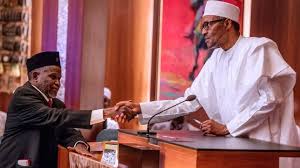 In 2004, Justice Stanley Nnaji of the Enugu state Judiciary was suspended from office by the National Judicial Council(NJC), for ordering the then Inspector General of Police, Tafa Balogun, to remove the then Anambra state Governor, Chris Ngige from office.
In 2004, Justice Stanley Nnaji of the Enugu state Judiciary was suspended from office by the National Judicial Council(NJC), for ordering the then Inspector General of Police, Tafa Balogun, to remove the then Anambra state Governor, Chris Ngige from office.
Also in the same year in Enugu state, Justice Anthony Onovo,ofthe Nsukka Judicial Division,was asked by the then Chief Justice of Nigeria and Chairman NJC to give reasons for delivering a controversial judgement.
Justice Onovo’s judgement had led to the demolition of a six bedroom bungalow,Nursery and Primary school and a poultry farm at No. 29 John Nwod close, Government Reservation Area,Enugu. The property belonged to a couple-Obed Chukwunedum and Linda Menakaya.
Following a petition written by to the Chief Justice by Menakaya,which alleged perversion of justice between Menakaya and one Dr.Harry Ezim-a United States of America based legal practitioner, the Chief Justice in a letter dated May 24, 2004,with reference No. NJC/873/1/185, requested Justice Onovo to respond ”urgently” to the petition.
Before this time Justice Onovo was transferred in 2002 from the Enugu Judicial Division toNsukka Judicial Division,but for undisclosed reasons, he continued to adjudicate on some cases, he was in charge in Enugu, before his transfer to Nsukka.
Of worry, is the fact that similar instances abound in several court rooms in the country,today.
Interestingly,the then state Chief Judge, never authorized Justice Onovo to conclude pending cases in his court before his transfer. This exposed his hidden interests in those cases.
The case between Dr. Ezim and Menakaya is one of such cases.
On 3, July, 2001, Dr. Ezim had instituted a suit in the state high court,against the 78year old retired Chief Agricultural Officer,in the old Anambra state, in a bid to claim ownership of No. 29 John Nwodo close.
In the suit No. E/18301,2001, Dr. Ezim prayed the court to declare that, he legitimatley acquired the property from the siblings of a deceased, Gabriel Okiyi, a close friend of Menakaya.
Indeed, court rooms are increasingly becoming waiting rooms of injustice.
But Menakaya through his counsel,Chief Anthony Mogboh, a Senior Advocate of Nigeria(SAN) countered Dr. Ezim’s claim. Chief Mogboh stated that his client bought the land from late Okiyi, when he was Director in the Ministry of Agriculture in the defunct East Central state and thereafter, proceeded to build a six bedroom bungalow, a poultry farm and a Nursery and Primary school. He maintained that his client,had lived there since 1981.
Surprisingly, on 19 March,2004, Justice Onovo delivered judgement against Menakaya. In his judgement,Justice Onovo declared Menakaya a tresspasser on the land,while also ruling that Dr. Ezim was the rightful owner of the disputed property.
Less than an hour after the judgement was delivered, Dr. Ezim mobilised 15 thugs,three anti riot policemen and 14 policemen from the Police Area Command, Enugu and one Ugwu, the then Chief Bailiff of the Enugu state High court to eject Menakaya and his family.
On Monday,March 22, armed with a ”warrant of possession”,which Dr. Ezim claimed originated from Justice Onovo, and a caterpillar,the entire buildings were demolished.
Menakaya’s case is just one out of several thousands that have gone unnoticed. Indeed,it is very odd for some questionable legal practitioners to relocate their chambers to beer parlours,in residential areas.
Their motives are reflected in a beer parlour operator’s words: “We always have our LLB, BL, beer parlour here for us,this is his chambers”.
Of interest,is the desperate attempts by individuals,who have acquired illegitimate wealth to invest same in landed properties in major cities in the country, of course,this can only be possible with the seal of the court rooms,and the footsteps of the law enforcement agents.
Are these attempts having the consent of the authorities that be ? Hopefully not !
Anti Graft Fight : Nigeria's Two Different Approaches
- By solomon2day
- On 09/08/2019
- Comments (0)
- In Solomon's Column
At a point in Nigeria's history, former President, Chief(Dr.)Olusegun Obasanjo stated ''it is a matter for regret that most public servants tend to subdue their political discipline in the face of personal aggrandizement''.
When Chief(Dr.)Obasanjo was in the saddle as President, he set up the Economic and Financial Crimes Commission(EFCC) to rein in fraudsters, money launderers, corrupt government officials and several others.
Perhaps, the EFCC, was to strengthen the activities of the Nigeria Police Force, while the Independent Corrupt Practices Commission(ICPC) was established to boost the work of the Code of Conduct Bureau.
During this period high profile personalities, like former Inspector General of Police, Mr. Tafa Balogun showcased the fight against corruption.
Sadly, happenings today, is a total and fierce departure from when Chief(Dr.)Obasanjo called the shots.
Interestingly, in an interview in 2007, prominent lawyer, Mr. Femi Falana(SAN), who was then a member of the National Conscience Party(NCP) had stated '' you in the media, you must challenge politicians, you must ask them for their programmes for our people as opposed to celebrating criminals. If somebody says he is a thief, you should ask him to resign''.
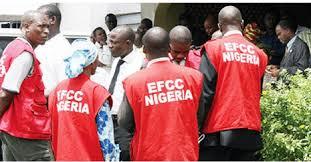 Unfortunately, Nigerians have continuously asked ''thieves'' to resign in this present administration without positive results.
Unfortunately, Nigerians have continuously asked ''thieves'' to resign in this present administration without positive results.
Of worry, however, is the fact that the youth now have the impression that corrupt practices are the only reliable path to success.
The youth readily make reference to the present administration's choice of Ministers as a source of inspiration to them
Nigerians express anger over the claim of the powers that be, that they have fought corruption to a commendable extent, even when it is very glaring that several officials of the present administration have cases of corruption trailing their daily lives.
Everywhere within the borders of Nigeria, fraudsters, corrupt government officials and related category of criminals are celebrated by their people, who believe these individuals are the heroes of this time.
The EFCC is now a shadow of its old self, only barking but not biting those it ought to bite.
If only the leadership had made transparency the guiding light to its activities, all the negatives trailing the country at home and abroad would never be the signposts of governance.
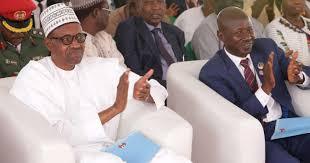 The increase in the pump price of the Kerosene has been described as a kite flown by government officials to deny Nigerian workers a new national minimum wage.
The increase in the pump price of the Kerosene has been described as a kite flown by government officials to deny Nigerian workers a new national minimum wage.
''The AWC concludes that government has a sinister agenda strangulate the Nigerian workers and the generality of the Nigerian people. The question we ask is that even if government will have to take the increased salaries back from the workers what about the unemployed, the retirees and all those who don't receive salaries from any source ? It means that government would visit them with unprecedented agony and pain'', the National Coordinator of the All Workers Convergence(AWC), Comrade Andrew Emelieze opined.
Nigerians express sadness that depsite the unconstitutional annexation of $1 Billion by the Federal Government for the procurment of all that is needed to checkmate the insecurity in the land, Kidanappings, killings and other violent crimes are not abetting, even though government has developed a new culture of commiseration and condolences to families who lost their loved ones to the reactionary approach by government to the unabating insecurity in the country.

